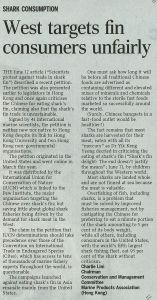 In recent months, we have seen an increase of messaging from the spokespeople of the shark fin trade. The information tends to be a clever mix of facts with baseless assertions so that misinformation appears to be plausible. Their basic claims are that sharks are not endangered or in need of protection, and the shark fin trade is not the primary cause of shark populations depletion, whereas scientific evidence indicates the opposite.
In recent months, we have seen an increase of messaging from the spokespeople of the shark fin trade. The information tends to be a clever mix of facts with baseless assertions so that misinformation appears to be plausible. Their basic claims are that sharks are not endangered or in need of protection, and the shark fin trade is not the primary cause of shark populations depletion, whereas scientific evidence indicates the opposite.
Last week, Mr. Charlie Lim of the Marine Products Association (MPA) of Hong Kong posted a statement in Singapore's Straits Times newspaper in reaction to an open letter by forty-one leading marine scientists declaring that the shark fin trade is not sustainable and sharks are in need of protection. Shark Savers presented that letter in Singapore earlier in the month. In this blog, we provide Shark Savers response to Mr. Lim, by our Asian Director, Jonn Lu. Unfortunately, the Straits Times did not publish our response.
If you would like to read everything in chronological order, please read the following before reading our response, below.
A recent statement by Charlie Lim of the Marine Products Association (MPA), Hong Kong, inaccurately described a letter from 41 leading marine scientists written to counter MPA “misinformation” regarding shark fin. Additional misinformation was included in Mr. Lim’s latest statement.
The scientists summarized the shark fin trade as follows:
“The shark fin trade… is NOT sustainable…[it] should be viewed as a major driver of global shark fishing activities, which are often unmanaged and conducted in an unsustainable manner.“ Download the Letter.
Mr. Lim claims the letter “criticizes the Chinese people for eating shark fin”, It does not, but doescriticize the MPA for its continuing misinformation which hinders members of the Chinese community from making informed decisions about impacts of the shark fin trade.
Mr. Lim claimed ‘most sharks are landed whole because their meat is valuable”. The evidence supports the opposite. Shark fins are valued at up to 200 times that of the meat; and for many species, there is little to no demand for the meat, only the fins. Thus, the global shark catch would be much lower without the shark fin demand.
Mr. Lim questioned the scientists’ preference for IUCN data over CITES to determine shark species’ risks of extinction. The IUCN is a scientific organization that only considers scientific analyses of populations to identify species at risk. In contrast, CITES is a political body that regulates trade of species at risk. The shark fin trade often highlights the fact that CITES lists only three species of sharks for protection as 'proof' that sharks don't need protection.
Recently, several shark species failed to achieve the necessary 2/3 vote of CITES member countries despite strong evidence for the need of protection. Mr. Lim’s trade coalition successfully influenced 1/3 of votes necessary to block the trade regulations. Mr. Lim prefers his odds at CITES, and indeed, the relative ease at blocking species from protection is the reason why so few sharks are listed. A serious observer of CITES would not recognize it as the best determinant of extinction risk.
Many shark populations are collapsing because of demand for their fins. Sharks are critically important to our oceans as apex predators. Thus, our taste for shark fin has a dangerously negative impact on the oceans’ ecosystems.
While Mr. Lim is entitled to his views, let us remember that his Marine Products Association exists to further the financial interests of the shark fin trade, not provide an unbiased view of shark populations. Your readers would be better served by reviewing the scientific evidence.
Jonn Lu, Director, Shark Savers Singapore